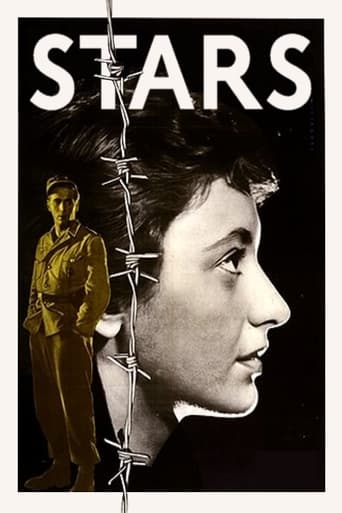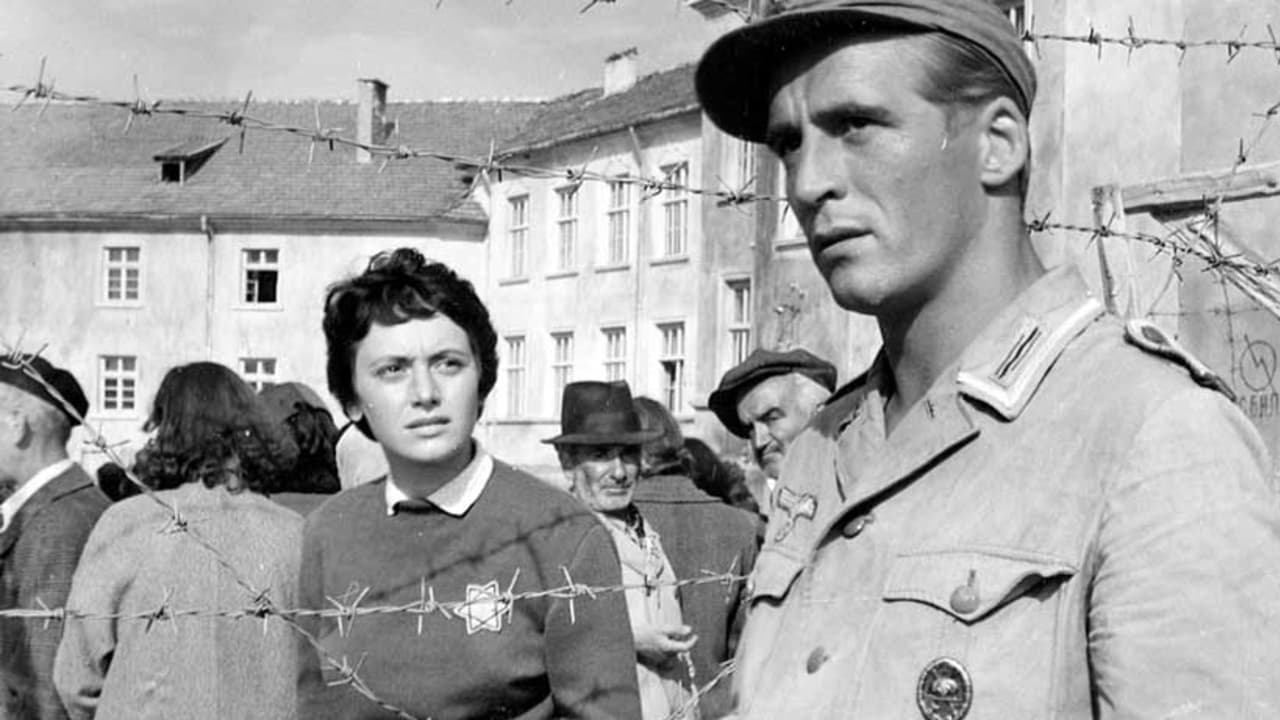Horst in Translation (filmreviews@web.de)
"Sterne" or "Stars" is an East German / Bulgarian black-and-white film from 1959, so this one is already almost 60 years old. The director is Konrad Wolf, one of the GDR's most successful filmmakers. He was not the most prolific filmmaker, also because of his fairly early death,but stuff like "Solo Sunny" or "Ich war neunzehn" is still known today. His work here is one of his earlier career projects. He was in his early 30s here. The 1950s were of course, also in film, mostly about coming to terms with the years of Nazi Germany and World War II and this is what the film is about too. It focuses on the romantic relationship between a Nazi officer and a Jewish woman, who is held prisoner with many others. I must say I am lightly surprised that this topic has not been used in films that many times really. Of course, it is a bit absurd because Nazis hated Jews, but if you see the German soldier as an individual, which they all were, then it totally makes sense. Lead actor Jürgen Frohriep portrayed him convincingly and his female equivalent Sasha Krusharska was at least as good. What a shame she did not pursue a career in films.I also liked some of the metaphors in here, such as the use of the baby he manages to save early, but that still dies eventually because of the difficult conditions, something that can be seen synonymously for their relationship with death awaiting at the very end. I personally believe many of the early war-themed films from the 1940s and 1950s were fairly forgettable and had little to offer about the subject really, but this one here is a bit of an exception. Wolf shows his skill and Bulgarian writer Angel Vagenshtain shows us why he was asked to work on several scripts back then that resulted in a handful films that are still above-average known compared to the many GDR films that vanished into oblivion over the decades. If you like black-and-white films and are interested in the complex subject of Nazi Germany, then this one is absolutely worth checking out. This film does not even attempt to be a defining work in terms of submitting knowledge to the audience. instead it goes for the very personal lives of the two main characters and manages an emotional achievement. Good decision, I recommend the watch.
didi-5
This East German film by Konrad Wolf did not reach the West until after the Cold War, and is rarely seen today. It concerns the story of a corporal, named 'Walter' (although his real name is never known) and played by Jürgen Frohriep with quiet complexity, and his relationship with interred German Jewess Ruth (played by the beautiful and powerful Sasha Krusharska) against the background of Nazism in Bulgaria, populated by inhuman oafs like Kurt (a repellent character played well by Erik S. Klein), and freedom fighters like Petko (Stefan Pejchev) and Blashe (Georgi Naumov).The film was made in 1959, centering on events in 1943, when the Jews were rounded up, held prisoner, and eventually shipped to the death camp at Auschwitz. It does not flinch from their predicament, denied medicine, herded together like cattle, huddled quietly and hopelessly in congested rooms. The music score uses Jewish songs to pinpoint the action and underline scenes which are otherwise silent - panning along the faces of the refugees in their dignified acceptance of their situation, or following the death transports as the men, women, and children are packed into carriages and sent away from Bulgaria like animals going to the slaughter.The power of this film is in its matter-of-fact treatment of what the Germans did to their Jewish countrymen and compatriots, in the name of racial purity, and how out of this one human relationship between - on the surface of it - enemies could grow and flourish. This concentration on Walter and Ruth makes the ending (also the beginning of the film, before the flashback) all the more poignant and touching.
Yancey
Even the two German states co-existed side by side for almost 40 years the cultural exchange was a minimum. One thing, West Germans should learn from the neighbors is the fact how seriously the East German cinema treated the difficult subject of the holocaust. STERNE (Stars) is one of the most touching movies I've ever seen. The tragic love story between a Jewish school teacher and a German soldier is filmed with decency and careful respect. Off course there is no happy-end. The movie ends with a shattering close up of the Jewish girl Ruth (Sascha Kruscharska) - staring out of the death train's barred skylight. How sad that even a movie like this didn't reach the Western audience during the cold war.
ivan-22
I saw this modest yet powerful film at Occidental College over a decade ago. There were only about two dozen people in the small classroom. There couldn't be a greater contrast with Hollywood's blockbusters. Instead of tormenting us with the horrors of war, this small screen, black and white film envelops us in a cozy intimacy and tries to reach for our deepest humanity and sense of poetry. We get the feeling that war is above all a profound shame, and that everyone is human. That's much more powerful than seeing a lot of combat footage. Small films like this do not even register on the radar of a jaded public. If they are not promoted by discerning people, they will fade into oblivion. Ironically, the most tragic thing about this film, is that it fails to make an impact. Don't you believe that the cream always rises to the top.


 AD
AD



